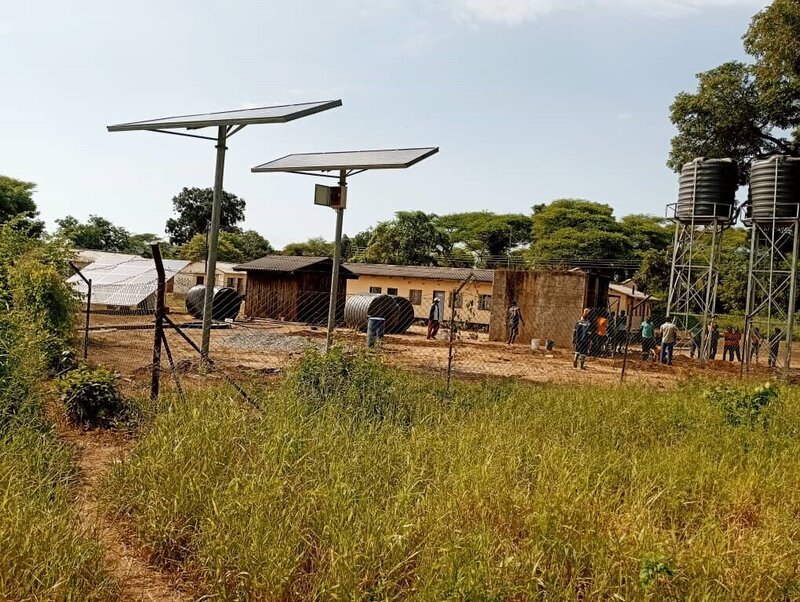Solar-Powered Water Schemes Transform Lives in Mbire, Zimbabwe

Solar-powered scheme installed at Masoka Clinic, Mbire.
In a region facing one of the worst droughts in a century, Zimbabwe, like many countries in Southern Africa, faces severe water scarcity. The relentless El Nino-induced drought has taken a toll on livelihoods, economies, and biodiversity, with communities across the region struggling to cope. In the Mbire district, this challenge has been particularly harsh.
For years, 60-year-old Gift Dzomba and his community in Masoka endured long treks to the Angwa River in search of water.
“This shared water source, frequented by wildlife, posed serious risks to villagers. "Some of us had to walk two kilometers through forests to reach the river,” Dzomba recalls. “We often encountered buffaloes and elephants along the way.”
Charity Mundeta, a local teacher, highlights how this burden affected education, especially for girls. Women and children, pushing wheelbarrows, would spend nearly an hour and a half each day collecting water.
“We often had to send girls home during their menstrual periods due to hygiene challenges,” Mundeta explains, adding that "fetching water in the morning meant they arrived late to school, making it common for girls to put in hard labor before even attending class.”
This daily struggle, borne mostly by women and girls, was a reality for many in Mbire, a district with severe water scarcity.
Mbire is located 283 kilometers north of Harare, the Zimbabwe capital. Bordering Zambia and Mozambique, it is a crucial wildlife corridor. Yet, its low and unpredictable rainfall, classified under Agro-Ecological Regions IV and V, creates severe water challenges. With an average annual rainfall of 400-500 mm, Mbire is one of Zimbabwe’s driest regions and is especially vulnerable to El Niño-induced droughts.
AWF's Intervention: Solar-Powered Water Schemes
In response to these challenges, the African Wildlife Foundation (AWF) installed four solar-powered piped water schemes in Mbire, benefiting the communities of Masoka, Kamufungu, Hambe, and Madzomba. Completed in March this year, this project was part of the ‘Utariri: Integrated, Biodiversity, Climate, and Livelihoods Program,’ funded by the Swedish International Development Agency (SIDA), Danish International Development Agency (DANIDA), and other private donors.
Mundeta and Dzomba agree that these water schemes have had a profound impact. Dzomba explains, “The Angwa River wasn’t a sustainable source of water, as we shared it with wild animals. This sometimes led to injuries or deaths.
The solar-powered schemes have changed this dynamic. “Now, water is available right outside our homes,” Mundeta adds, "and school attendance has improved because girls no longer have to fetch water in the mornings."
Positive Impacts on Education, Health, and Livelihoods
Access to clean water has transformed the lives of over 1,200 households, particularly women and children. They now have more time for productive activities, and the community has seen marked improvements in health outcomes.
Dzikamai Mazhomba, a nurse at Masoka Clinic, reports a significant drop in diarrhea cases in areas with piped water. “We’ve seen a dramatic reduction in diarrhea infections, with only one or two cases monthly compared to many more in areas without the schemes,” Mazhomba notes.
Students are now able to wash their hands regularly, reducing the spread of illness. “Before the water system, students couldn’t wash their hands after using the toilet or before eating. Now, this simple act has made a big difference,” says Mundeta.
To ensure the long-term success of these schemes, AWF has supported the formation of asset management committees in Mbire. Dzomba, a member of the Masoka committee, explains how the community contributes to maintaining the system: "Each household contributes $2 every three months for repairs and upkeep, ensuring that we can have piped water for life."
Sustainable Livelihoods and Conservation
The Utariri project has improved access to water for both people and livestock, helping to reduce human-wildlife conflicts. With a reliable water supply, many farmers are now focusing on livestock production, which is quickly becoming a sustainable and profitable business. This shift also eases pressure on natural resources, reducing the need for illegal hunting of wildlife for food.
By tackling the root causes of human-wildlife conflict and promoting sustainable livelihoods, the Utariri project is fostering peaceful coexistence between communities and wildlife in Mbire and the broader Mid-Zambezi Landscape.
As Zimbabwe continues to face the effects of drought, AWF’s interventions, such as the Utariri project, are building resilience and ensuring a brighter future for communities like those in Mbire.